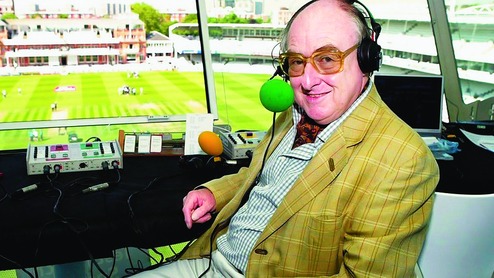
London, June 24: Cricket commentator Henry Blofeld, who announced his retirement yesterday, made fun of himself by saying: "Listeners will now be relieved to know that their chances of being told the right name of the fielders at third man and fine leg have greatly increased."
Blofeld - "Blowers" to millions of fans around the world of BBC Radio 4's TMS (Test Match Special) - is known for not always being accurate with the identities of players fielding in distant corners of a cricket field such as third man.
He is also known for his habit of referring to all and sundry as "My dear old thing" and expressing inordinate pleasure when spotting a pigeon or a red bus or a crane.
This morning he was on a chat show on Radio 4 explaining the magic of Test match cricket: "A fast bowler takes a long time to walk up to the top of his run. He takes a long time to bowl six balls. He bowls them outside the off stump. And the batsman leaves them well alone."
At a time when just about everything seems to be going wrong with the country, he has reminded people of a sunlit England where all was well. It is said he brought a touch of P.G. Wodehouse to Test match commentary.
Indeed, when Blofeld was a guest on the Desert Island Discs radio programme in 2003, he had named his favourite book as " A Pelican at Blandings by P.G. Wodehouse".
Blofeld, who began his career on TMS in 1972, said: "All good things come to an end. After nearly 50 years in the Test Match Special commentary box, I have decided the time has come for the last of the old f**ts to hang up his microphone."
"In all honesty, at the age of almost 78, although I am still rather keener than mustard, I find it harder work than I once did," he admitted. "The one thing I don't want to do more than anything is for my incompetence to let TMS down.
"You haven't heard my final 'My dear old thing' quite yet," he added. "Happily, I shall be commentating next month on the first two Tests against South Africa, and then for the last one of the summer against the West Indies at Lord's.
"I hope some will be sad that they will now hear less about the lifestyles of pigeons, seagulls, and helicopters although I fear the general feeling will be one of huge relief. Now, I shall be able to come to the cricket without worrying about who is lurking down at third man. I shall also be able to have a drink without feeling I am being politically incorrect."
He added: "I have to bow out when people are going to say, 'Why has Henry Blofeld gone?' and not 'Why the hell hasn't Henry Blofeld gone?'"
With his plummy voice, Blofeld sounded very much like the Old Etonian that he was. He was a prodigious batsman and wicketkeeper at school, where he was captain in his final year.
But his sporting hopes were dashed at the age of 17 when he was hit by a bus on his bicycle and "lay like a broken jam roll in the gutter". He spent 28 days in a coma "and the doctors had to dig out bits of skull from my brain".
Although his injuries curtailed his subsequent cricketing career, Blofeld did go on to play 16 first-class matches for Cambridge University during 1958 and 1959.
In 1976, Blofeld and a motley crew of companions set off for India in a maroon 1921 Rolls-Royce Silver Ghost, ahead of that winter's Test cricket series between India and England. He recounted the highlights of the trip in his book, Squeezing the Orange.
To listeners who take the view that commentators should stick only to the cricket, Blofeld said: "I always say a day's cricket is like a symphony. There are fast bits, where you only describe the action. Then there are slower bits that can be a little bit dull. So you fill in by talking about the lady in the yellow dress, the trees, (and) the sponge cake a listener has sent in."
Henry's father, Thomas Robert Calthorpe Blofeld (1903-1986), was at Eton with Ian Fleming, who would find worldwide fame as the author of the James Bond novels.
Henry has confirmed that when he himself met Fleming, the latter told him he was stuck when trying to think of a suitable name for a villain. Then, at a club lunch, Fleming looked at all those who had signed in and came across the name of his old classmate.
And at that moment the Bond super-villain, Ernst Stavro Blofeld, head of the global criminal organisation SPECTRE, came into being. He has been played on screen by a number of actors, including Donald Pleasence, Telly Savalas, Charles Gray, Max von Sydow, and Christoph Waltz, often stroking a white cat.
Like Bond, Henry Blofeld has not been exactly slow with the ladies, either. He is now on his third wife.










